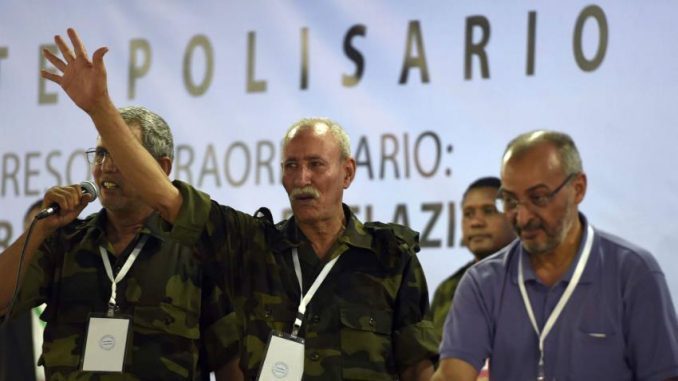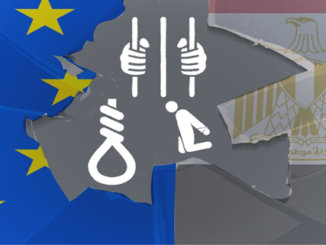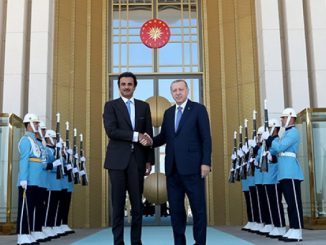Ambiguity pervaded the Egyptian position after nine Arab countries on Tuesday night announced their withdrawal from the fourth Arab-African summit in the capital of Equatorial Guinea, Malabo, in solidarity with Morocco, which protested the insistence of the African Union on the participation of a delegation of the so-called “Sahrawi Arab Democratic Republic”- that was unilaterally declared by the “Polisario Front” in 1976 – in the summit.
The Arab countries that pulled out are: Morocco, Bahrain, Saudi Arabia, UAE, Qatar, Yemen, Oman, Somalia and Jordan.
On the contrary, Egypt al-Sisi declared its participation in the summit with al-Sisi’s arrival to Equatorial Guinea after he ended his visit to Portugal.
Egypt’s latest movement has explicitly departed from supporting Morocco in preserving its territorial integrity when it received the Polisario Separatist Movement delegation in Egypt recently.
Egypt’s stance is expected to raise tensions between the two countries
Last week, a delegation of Western Sahara’s Polisario separatist movement were allowed to take part in the joint Arab-African parliamentary congress in Sharm el-Sheikh in Egypt.
The five-member Polisario delegation participated in the celebrations for the 150th anniversary of the Egyptian parliament, which coincided with a joint session of the Arab Parliamentary Union and the African Parliamentary Union, a Polisario source was cited by al-Masry al-Youm. an Egyptian independent newspaper.
The Polisario delegation was headed by Khatri Addouh, chairperson of the Sahrawi National Council and Suilma Hay Emhamed al-Kaid, vice-president of the Pan-African Parliament
The delegation met with heads of Arab and African parliaments, including an unofficial meeting with Egypt’s speaker of parliament, Ali Abdel Aal, the source added.
In response, Egypt tried to defend its stance and denied extending any formal invitation to the group, arguing that the parliament did not bear any responsibility for the delegation’s “stopover” in the country
In the same context, Osama Heikal, the head of the Egyptian Parliament’s media committee, denied that his country extended an invitation to a delegation of the self-proclaimed Sahrawi Arab Democratic Republic to participate in the event.
Yet, the Egyptian official said that his country was only the event’s host country and had no power to decide who should be invited to participate in it.
“Egypt is just the host country. The African parliament is the only party eligible to extend invitations,” according to Osama Heikal’s statement.
The Polisario Front, which is a Sahrawi national liberation movement working to end Moroccan presence and to establish an independent nation, has disputed with the government of Morocco over the sovereignty in Western Sahara.
Morocco and the Polisario Front fought together after Spain’s colonial administration of Western Sahara ended in 1976.
The UN mission, known as MINURSO, is tasked with monitoring a ceasefire reached in September 1991 and organizing a referendum on self-determination in Western Sahara.
The Moroccans’ outrage
Egypt’s hosting to a Polisario separatist delegation ignited outrage and dissent in Morocco.
Hosting the Polisario Separatist Movement opened fire on Egypt and it seems that no justification would ever convince the Moroccan counterpart.
In response, the Moroccan media outlets attacked Egypt’s stance.
In this context, Morocco’s Hespress news website said that hosting the delegation at the conference, which was attended by Abdel Fattah al-Sisi, was “provocative”, as reported by
al-Arabi al-Jadeed.
It said, “Egypt has once again taken a hostile stance against Morocco,” adding that the move was likely to raise tensions between the two countries
Moreover, Al Jazeera’s prominent Moroccan anchor Abdessamad Nacir has criticized Egypt’s move, also describing it as “provocative”.
He wrote on Twitter, “I look forward to Morocco’s response to Sisi’s Egypt hosting a Polisario Front delegation at the Arab-African parliamentary congress.”
He also said in another Tweet, “It is now clear to everyone that Sisi has betrayed all Arabs. He betrayed Saudi Arabia in Yemen by helping the Houthis, and here he is now betraying Morocco.”
In the same context, Samir Bennis, the co-founder of and editor-in-chief of Morocco World News, commented on Osama Heikal’s statement when he said that Egypt was only the event’s host and described it as “a rambling statement” that does not stand up to scrutiny and fails to convince Moroccans that Egypt is still loyal to the position of support for Morocco’s position on the Western Sahara.
“As a host country, Egypt does, indeed, have the power to decide who can enter it and who is not entitled to do so. In this case, since Egypt is aware of Morocco’s position and of the position of the African parliament, it could have requested that the Polisario be excluded from participating in such a gathering,” said Samir Bennis.
Bennis also considered allowing the Polisario to participate in such a meeting and display the flag of its self-proclaimed republic means that Egypt is sending ambiguous signals with regards to its foreign policy orientations, and that it is also using this event to play off the rivalry between Morocco and Algeria.
In the same context, the Moroccan musician Nouamane Lahlou expressed his anger and cancelled his upcoming visit to Egypt, describing the hosting of the Polisario delegation as a “great shock”.
He announced on his
Facebook Page, “To all my friends in Egypt who were expecting my visit on 2 November; I have cancelled my visit and apologized to the TV channels which were supposed to host me, as well as Helwan University, where I was going to give a lecture about Moroccan music.”
He added, “It has been a great shock for all Moroccans that the Egyptian parliament speaker – who is supposed to speak on behalf of the people – hosted a delegation of the separatist Polisario Front.”
The Moroccan musician urged other Moroccan artists residing in Egypt to take a stance or denounce the move, “so the Egyptian people would realize how much they have offended the people who love them”.
In addition, the Moroccan-Danish Forum has demanded a clarification on the matter from the Egyptian Embassy in Copenhagen, according to Morocco World News.
A letter to the embassy said the move showed Egypt’s disregard for historical legitimacy and recklessness towards long-standing diplomatic ties.
Egypt’s contradictory foreign policy towards Morocco
Since al-Sisi reached power in military coup in 2013, Egypt’s foreign policy toward Morocco was marked with contradictions.
During the unprecedented tension between Rabat and the United Nations Secretariat in March, following Ban Ki-moon’s statement describing Morocco’s presence in the Western Sahara as “occupation.”
Within this crisis and the negotiations that preceded the adoption of Security Council Resolution 2285 to renew the mandate of the UN Mission in the Western Sahara (MINURSO), Egypt, alongside Spain, Senegal and France, played a prominent role in preventing the Security Council from siding with Ban Ki-moon.
In addition, Egyptian Foreign Minister Sameh Shoukry repeated the same position of support to Morocco in a meeting with a delegation of Moroccan media professionals in Egypt in May.
However, Egypt’s stance during the 27th summit of the African Union indicates that its support for Morocco is not as fixed as it claims.
In July, when King Mohammed VI sent a letter to the AU summit held in Kigali, 28 countries submitted a motion to the AU secretariat calling for the suspension of Polisario’s membership as a first step to enable Morocco’s return to the organization. Egypt withdrew away from signing this motion although it supported Morocco a few months ago.
In a search for a clear justification for Egypt’s contradiction, the Moroccan media widely commented on that abstention, with many observers expressing their incomprehension of Egypt’s position on the Western Sahara.
In al-Arabi al-Jadeed, Samir Bennis wrote in his article titled: “Why Morocco should be suspicious of al-Sisi regime,” that the move is reminiscent of Egypt’s gesticulations in 2014. “While Morocco had adopted a neutral stance regarding Sisi’s rise to power, and issued a statement to recognize him as Egyptian President, it was the target of an unprecedented wave of attacks from the Egyptian media.”
During this time, Egyptian media close to al-Sisi labelled Morocco as the “hub of sorcery, prostitution, as well as among the countries affected by HIV.” He added, “To add insult to injury, al-Azhar said the day of Eid El Fitr in Morocco was invalid.”
But Egypt took an initiative to ease the tensions between both countries when Abdel Fattah al-Sisi sent a letter to King Mohammed VI in January 2015, and sent his Foreign Minister, Sameh Shoukry to Rabat. During the meeting, the Egyptian Minister renewed his country’s support for Morocco’s territorial integrity.
“However, it seems that this statement was neither sincere nor rooted in a consistent foreign policy orientation. The presence of a Polisario delegation on Egyptian soil indicates that Cairo’s support for Morocco is contingent on several factors that have to do with Morocco’s domestic policy and its positioning on the regional and global stages,” according to Samir Bennis.
Is Egypt changing its alliance towards Algeria to secure oil
In fact, there are different interpretations that can explain the change in Egypt’s stance towards Morocco and its territorial integrity.
First of all, the deterioration of relations between Egypt and its Gulf financial supporter Saudi Arabia -which has recently expressed strong support for Morocco’s position on the Sahara in the GCC-Morocco Summit held in Riyadh last April.
In addition, Saudi Arabia withdrew from the Arab African Summit in Equatorial Guinea because of the insistence of the African Union on the participation of the Polisario’s Separatist Movement in the summit, according to the
Huffington Post.
Other countries followed Saudi Arabia and withdrew from the summit as UAE, Qatar, Bahrain, and Oman. However, al-Sisi was keen to join the Arab African Summit in Equatorial Guinea after he ended his visit to Portugal.
Saudi Arabia was the major supporter of al-Sisi since he led a military coup in 2013 against Egypt’s first democratically elected President Mohamed Morsi. Moreover, al-Sisi has enjoyed the financial and political support of Saudi Arabia and Gulf monarchies after he took power in 2014.
However, tensions intensified between Egypt and Saudi Arabia when Egypt has taken various stances that stand at the opposite side of the Kingdom regarding different regional issues.
In September, relations between the two countries have soured when Egypt sent a delegation to participate in Grozny conference in Chechnya, under the aegis of Russia and Iran.
The event, which addressed the issue of Salafism and terrorism, was attended by the Grand Imam of al-Azhar (Egypt’s religious official institution) Sheikh Ahmad al-Tayeb.
In the conference, Al-Tayeb’s participation caused unprecedented outrage among the Saudi circles who protested excluding the Salafists from Ahl- al-Sunnah’s definition when al-Tayeb enlisted those who are included in this term during the conference
Regarding the Syrian file, Egypt’s delegation in the security council voted in favor of the Russian resolution, a situation that raised concern among Saudi political bureau.
The Saudi’s ambassador to the UN Abduallah al-Mouallimi condemned Egypt’s vote to the favor of the Russian resolution and described it with the “painful” stance. After the voting, al-Mouallimi said, “It was painful that the Senegalese and Malaysian stance was closer to the Arab’s consensus than the Egyptian delegation.”
He also said that he feels pity for these countries that voted to the Russian resolution, stressing that his country will continue in backing the Syrian people by all means. Al-Mouallimi continued saying, “It was an absurdness series to present an anti-resolution that didn’t have except four approvals.”
The latest Egyptian vote in support for the Russian resolution represents another blow in the light of the Egyptian Saudi relations. In response, Riyadh immediately halted its supply of oil to Cairo.
As a result, some observers believe that Egypt’s welcoming of a Polisario delegation can be understood both as a provocation for Morocco and its Saudi ally, as well as a calculated move to please the Algerians.
“After Riyadh cut its oil supply to Cairo, Egypt is in urgent need of a replacement. Since the Egyptians know the rivalry between Morocco and Algeria, they found no better card to play off this rivalry and get closer to Algeria and its oil than welcoming a Polisario delegation,” said Samir Bennis.
Another reason that would interpret Egypt’s stance to welcome this delegation is the presence of an Islamist party in the Moroccan government.
It is noteworthy that al-Sisi came to power after he led a military coup in 2013 against Egypt’s first democratically elected and the Muslim Brotherhood leader Mohamed Morsi.
According to Samir Bennis, “This explains why he is so sensitive towards Islamists, including Morocco’s Party of Justice and Development, which Sisi’s media consider as an “offshoot of the Muslim Brotherhood.”
It seems that the success of the Morocco’s Islamist party for its second consecutive term in the election have been seen by the Egyptian regime as a major fault for its hostile policy against the Islamists and their rule.
“By embracing the Polisario, Cairo conveys its displeasure to Morocco for allowing the Islamist party to be in power for five more years. Perhaps Sisi was expecting Morocco’s king to intervene in the elections and prevent the Islamists from being in government again,” said Samir Bennis.
He added,” But Morocco has chosen a different way and has embraced the path of democracy.”
According to Bennis, “The fluctuations that have characterized the relationship between Morocco and Egypt since July 2013 and Sisi’s shifting positions toward Cairo’s traditional allies demonstrate that this government cannot be relied upon to provide unwavering support to Rabat in the future.”
He also advised Rabat to look for other “alternatives to secure its position with regards to the Sahara and offset Egypt’s defection. “He continued that King Mohammed VI’s visit this week to Rwanda, Ethiopia and Tanzania goes in the right direction and has the potential to allow Morocco to bolster the support it needs to face Algeria and its new ally (Egypt).
There is no doubt that al-Sisi’s shifting alliances trend has been a trademark of his foreign policy, as he didn’t hesitate to turn his back coldly on Saudi Arabia-one of his major financial supporter that have poured billions of dollars to balance his reign. But on the contrary, he has taken steady steps shifting to the Russian and Iranian axis – Saudi Arabia’s rival enemies. In this context, everything is expected from Egypt’s al-Sisi regime.




